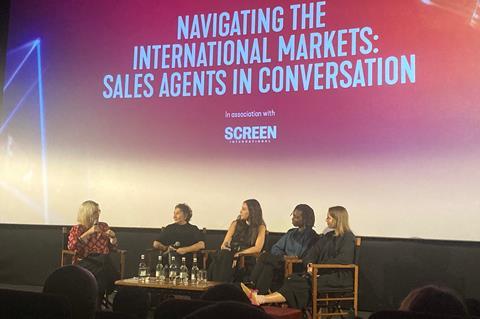
Films with a local “charm”, that sit within a genre framework, and not straight drama, are the qualities the market is looking for, said a panel of international sales agents talking at the BFI London Film Festival today (October 14).
“Local specificity, that gives a story nuance, a charm, a distinctiveness, that still sits within a genre framework, still has universal accessibility,” were the factors the market is backing, said Sophie Green, head of acquisitions and development at the UK’s Bankside Films.
“Everybody is really championing the ‘local for global’,” she added.
Green gave the example of Jim Archer’s Brian And Charles, for which Bankside sold worldwide rights to Focus Features/Universal after its Sundance 2022 premiere. “Very small, couldn’t be more quirky, set in rural Wales on a wet rural farm… It was full of humour, but also felt different and interesting. That Welshness and mockumentary aspect gave it enough of a point of difference without it being too local, too limiting.”
Kneecap was another example of a local film with global reach. The biopic of an Irish-language Belfast-based hip-hop band of whom few outside of the island of Ireland had previously heard, launched at Sundance earlier this year, and passed the £2m mark at the UK-Ireland box office for Curzon and Wildcard.
“We’re all watching the success of Kneecap,” said Madeleine Tangney, director of sales at Visit Films. The US outfit has a project in development called Skintown, based on an Irish novel by Ciaran McMenamin.
“It’s two teenage boys who are best friends, near the end of ‘the troubles’, but there are a lot of universal elements there as well,” suggested Tangney. “We do definitely have concerns when something feels hyperlocal, it’s not going to translate well.”
Tangney says the Kneecap effect is intriguing buyers. “When I’m talking to buyers about [Skintown], Kneecap’s success makes them think this will do well. But how does this distinguish itself from Kneecap?”
Down but not out
Drama remains a struggle. “The big takeaway at the moment from the market is: anything but drama,” said Green. “This is double underlined everywhere we go. And of course, you’ve got to take that with a pinch of salt, because yes [it can work] if you get a wonderful festival premiere and it gets well reviewed, but you’ve got to get there first.”
“During Covid, and after, people were leaning into an escapism,” observed Tangney. “They don’t want to go to a theatre and watch a film that’s going to remind them of the problems they’re already dealing with in their everyday lives. Those have been harder sells.”
But drama isn’t dead. Bankside still has around “eight or nine” dramas on its slate, said Green, but in order to work they need to “comedic, feel good, life affirming, positive messaging. It can’t be a mirror up to society where it’s too bleak, too harsh, too real”.
“Drama is the core of independent cinema,” said Sata Cissokho, head of acquisitions at French sales agent Memento International. “It’s been challenging, and it’s led us to diversify our slate. So having those dramas we’ve been working on forever, because this is what we do as independent companies, but also offering to the market genre films, comedies.”
A successful festival world premiere, with awards to boot, are more important than ever, believes Virginie Devesa, founder of Paris-based Alpha Violet, which represents Sundance grand jury prize winner Sujo, playing at BFI London Film Festival. “Basically, make the movie sexy, then it sells,” she said.
BFI London Film Festival runs until October 20.























2 Readers' comments